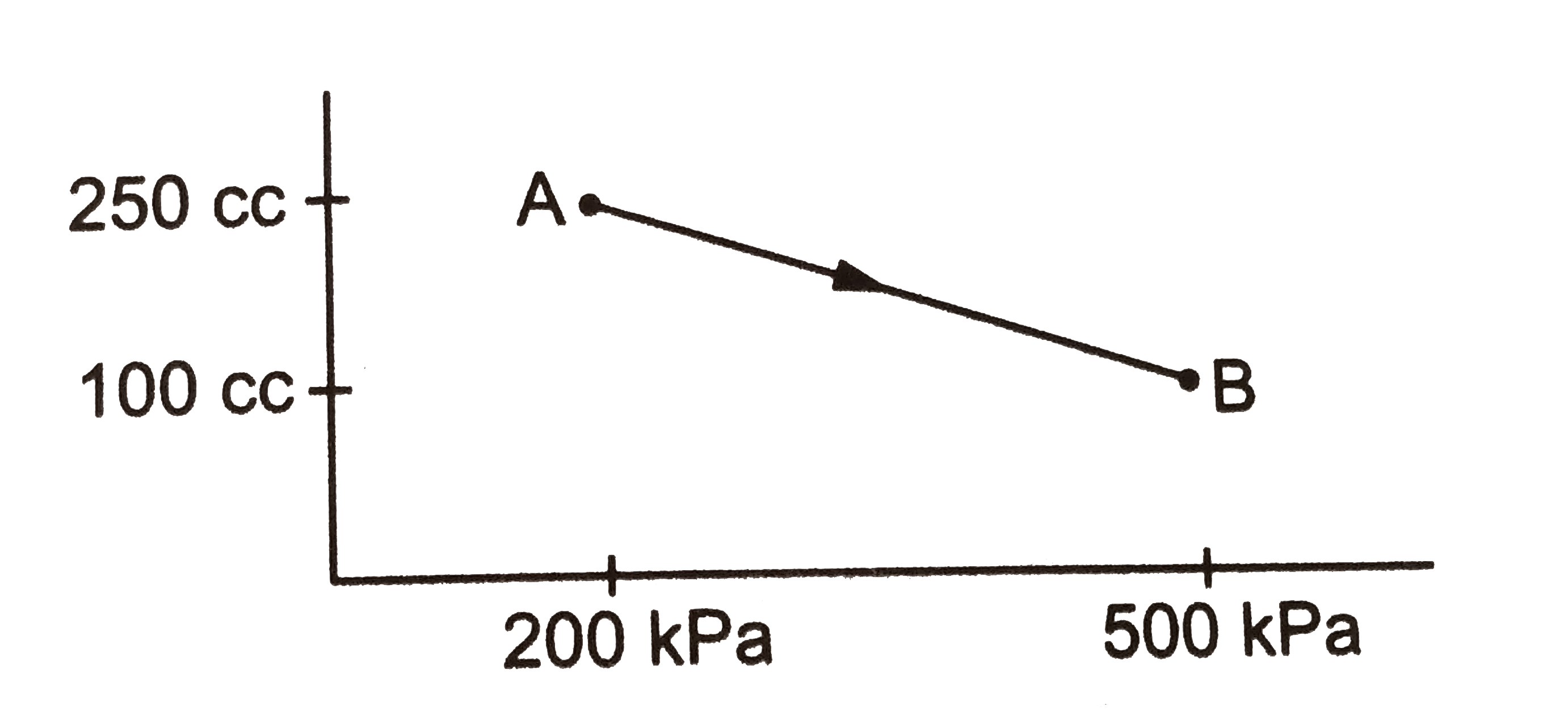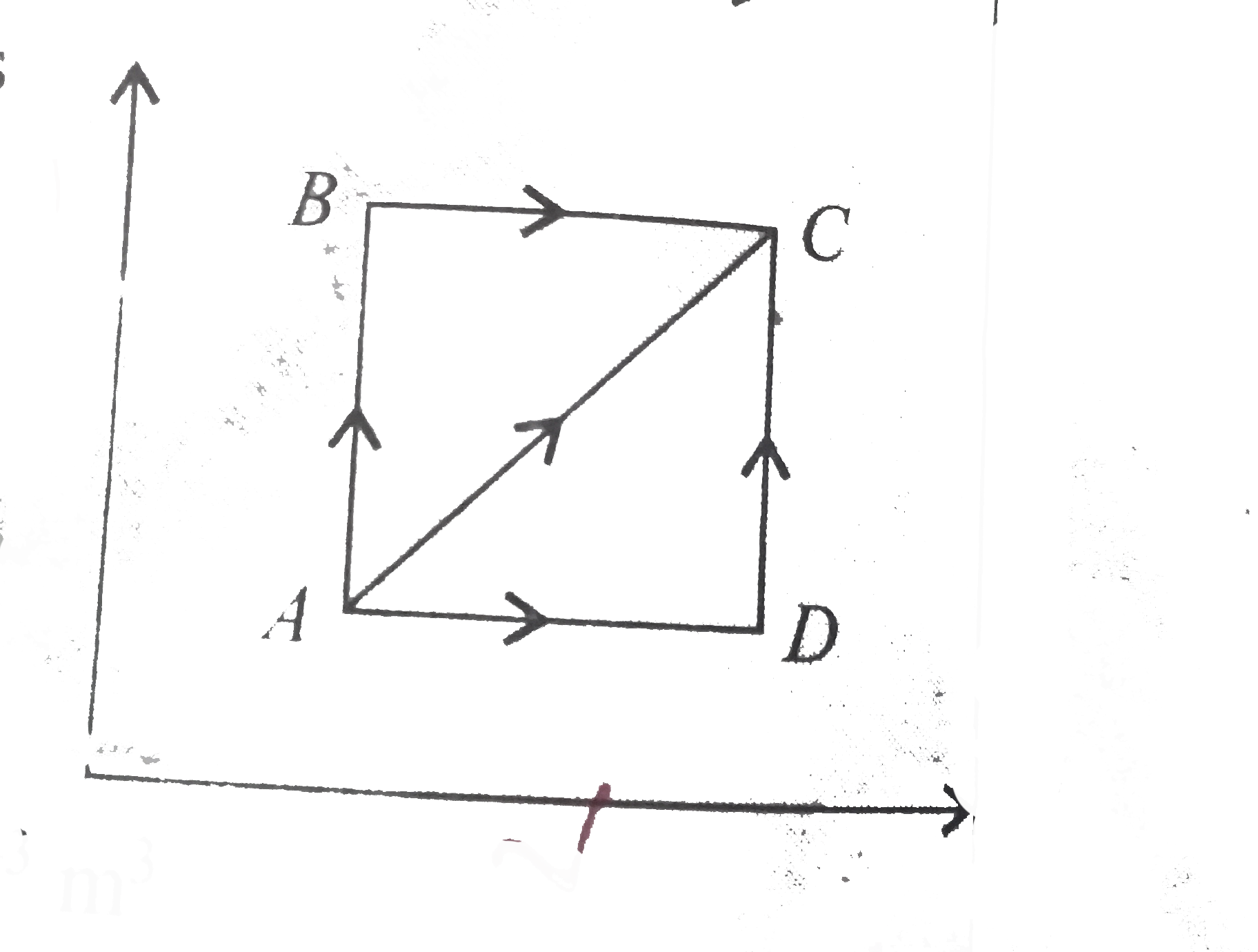In what process is the heat added entirely converted into internal energy of the system ?
To determine the process in which the heat added to a system is entirely converted into the internal energy of that system, we can follow these steps:
1. Understand the First Law of Thermodynamics:
The first law of thermodynamics states that the change in internal energy (dU) of a system is equal to the heat added to the system (dQ) minus the work done by the system (dW). This can be expressed mathematically as:
dQ=dU+dW
2. Identify Conditions for Heat Conversion:
For the heat added to be entirely converted into internal energy, the work done (dW) must be zero. This means:
dQ=dU(if dW=0)
3. Determine the Type of Process:
A process where the volume of the system remains constant is known as an isochoric process. In an isochoric process, since the volume does not change, there is no work done by the system:
dW=P⋅dV=0(because dV=0)
4. Conclusion:
Since in an isochoric process the work done is zero, all the heat added to the system is converted into internal energy. Therefore, the answer to the question is:
Isochoric process
Final Answer:
The heat added is entirely converted into internal energy of the system during an Isochoric process.
---
The first law of thermodynamics states that the change in internal energy (dU) of a system is equal to the heat added to the system (dQ) minus the work done by the system (dW). This can be expressed mathematically as:
dQ=dU+dW
For the heat added to be entirely converted into internal energy, the work done (dW) must be zero. This means:
dQ=dU(if dW=0)
A process where the volume of the system remains constant is known as an isochoric process. In an isochoric process, since the volume does not change, there is no work done by the system:
dW=P⋅dV=0(because dV=0)
Since in an isochoric process the work done is zero, all the heat added to the system is converted into internal energy. Therefore, the answer to the question is:
Isochoric process
The heat added is entirely converted into internal energy of the system during an Isochoric process.
Topper's Solved these Questions
- KINETIC THEORY OF GASES AND FIRST LAW OF THERMODYNAMICSBOOK - CENGAGE PHYSICS ENGLISHCHAPTER - KINETIC THEORY OF GASES AND FIRST LAW OF THERMODYNAMICSEXERCISE - Subjective
22 Videos
- KINETIC THEORY OF GASES AND FIRST LAW OF THERMODYNAMICSBOOK - CENGAGE PHYSICS ENGLISHCHAPTER - KINETIC THEORY OF GASES AND FIRST LAW OF THERMODYNAMICSEXERCISE - Single Correct
140 Videos
- KINETIC THEORY OF GASES AND FIRST LAW OF THERMODYNAMICSBOOK - CENGAGE PHYSICS ENGLISHCHAPTER - KINETIC THEORY OF GASES AND FIRST LAW OF THERMODYNAMICSEXERCISE - Exercise 2.1
20 Videos
- KINETIC THEORY OF GASESBOOK - CENGAGE PHYSICS ENGLISHCHAPTER - KINETIC THEORY OF GASESEXERCISE - Compression
2 Videos
- LINEAR AND ANGULAR SIMPLE HARMONIC MOTIONBOOK - CENGAGE PHYSICS ENGLISHCHAPTER - LINEAR AND ANGULAR SIMPLE HARMONIC MOTIONEXERCISE - Single correct anwer type
14 Videos
Similar Questions
Knowledge Check
A system absorbs 50 kJ heat and does 20 kJ of work. What is the net change in the internal energy of the system ?
AIncrease by 30 kJBDecrease by 30 kJCIncrease by 70 kJDDecrease by 70 kJ200 joules of heat was supplied to a system at constant volume. It resulted in the increase in temperature of the system from 298 to 323 K. What is the change in internal energy of the system ?
A400 JB200 JC50 JD150 J
A : During a cyclic process work done by the system is zero.
R : Heat supplied to a system in the cyclic process converts into internal energy of the system.
View SolutionThe work done by a system is 8 Joule, when 40 joule heat is supplied to it .What is the increase in internal energy of the system?
View SolutionA system absorbs 1500 joule of energy as heat and produces 500 joule of work .the change in internal energy of the system will be :
View SolutionA gas is taken along the path AB as shown in fig, if 70 cal of heat is extracted from the gas in the process, calculate the change in the internal energy of the system.

View SolutionA thermodynamic process is shown in the following figure. The process and volumes corresponding to some points in the figure are:
PA=3×103Pa,
VA=2×10−3m−3,
PB=3×104Pa,VD=2×10−3m3
In process AB,600J of heat is added to the system and in the process BC,200J of heat is added to the system. the change in internla energy of the system in the process AC would be

View SolutionAssertion In isothermal process, whole of the heat energy supplied to the body is converted into internal energy.
Reason According to the first laq of thermodynamics,
" "△Q=△U+△W
View Solution
